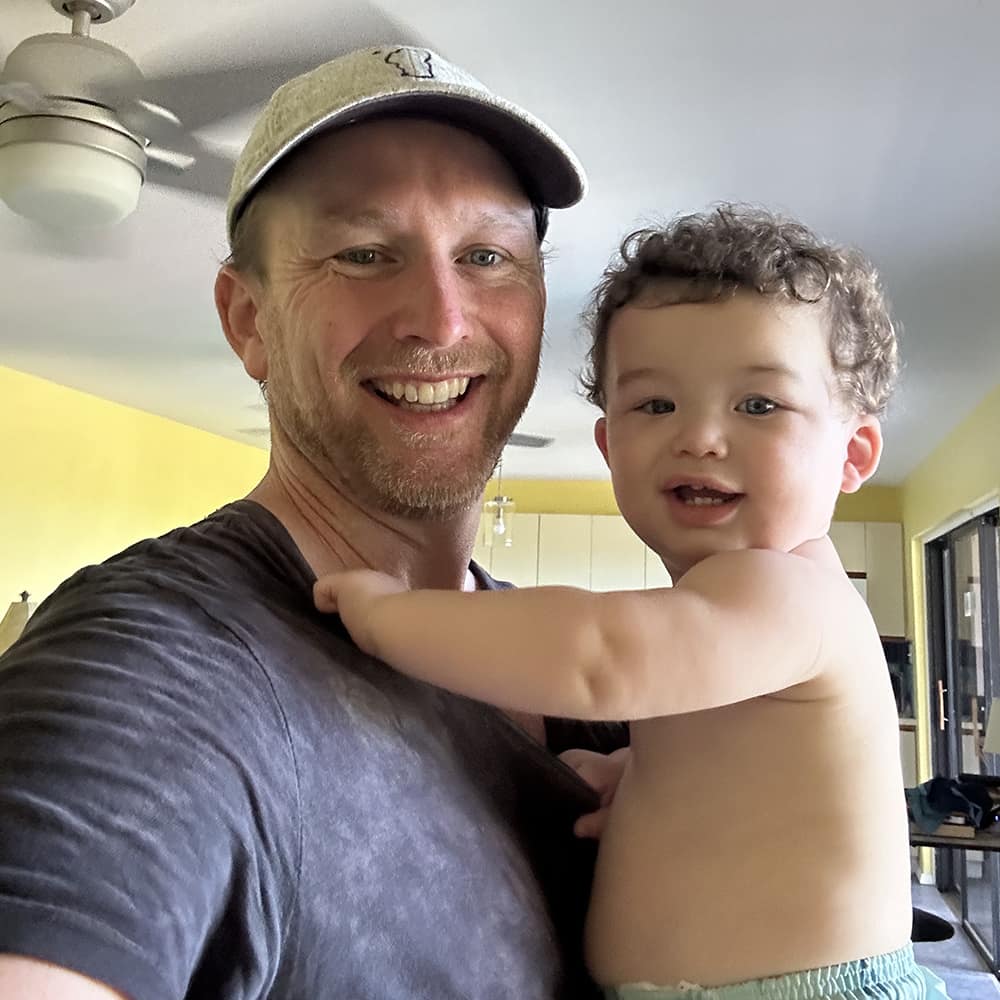

Embry-Riddle Degree Helps Air Traffic Controller Keep Success on the Radar

For David Self (’24), earning his B.S. in Aeronautics with Embry-Riddle Worldwide has not only empowered growth, but it’s also enabled him to address the ongoing shortage of qualified controllers and the strain that puts on the entire ATC system.
 David Self takes a break from working and studying to spend time with his son, Samuel.
David Self takes a break from working and studying to spend time with his son, Samuel.
David, a native of Bakersfield, California, had the unique experience of growing up in two distinctly different locations: San Clemente, California and Ka'u, Hawaii.
He credits his parents, Ronald and Jannie Self, with providing a “nurturing environment alongside my brother, Alex,” adding that “my upbringing in these vibrant communities shaped my diverse interests and adaptability.”
Today, David is a controller at Northern California Terminal Radar Approach Control, coordinating aircraft movement through the airspace of major airports like San Francisco, Oakland and San Jose, specializing in San Francisco arrivals.
David recently took time to discuss his aviation journey, his Embry-Riddle experience, and the Capstone Project paper he wrote about the challenges facing today’s ATC infrastructure.
How and when did you first get interested in aviation?
My interest in aviation wasn't immediate but grew from a childhood curiosity about being a fighter pilot and launching model rockets with friends in San Clemente. However, my focused interest in aviation really took shape when I selected my Rating as an Air Traffic Controlman in the U.S. Navy, which steered me toward a deeper engagement with the field.
Tell us about your military service
After spending a couple of years at the University of Hawai'i at Hilo, I enlisted in the Navy at Pearl Harbor. I completed basic training in Great Lakes, Illinois, and went on to Air Traffic Control "A" school in Pensacola, Florida.
My first duty station included four formative years at Whidbey Island, Washington, where I developed and honed my skills in the Terminal Radar Approach Control and the Control Tower.
I later served at Navy Support Facility Diego Garcia in the middle of the Indian Ocean and, eventually, as a defense contractor in Kabul, Afghanistan, assisting the Air Force and Navy with air traffic control operations during Operation Enduring Freedom.
When and why did you choose Embry-Riddle for your Aeronautics degree?
Choosing Embry-Riddle was a strategic decision aligned with my aviation career. After initially starting my degree in history before joining the Navy, I wanted to complete my education but decided to change my major to focus on a strong foundation in aeronautics, leveraging my professional experiences to deepen my understanding of the field.
What have been some highlights of your Embry-Riddle experience?
A major highlight was my final Capstone course, ASCI 491 Operational Applications in Aeronautics. It allowed me to research and write extensively about critical issues like air traffic control infrastructure and controller shortages, applying theoretical knowledge to real-world challenges.
Tell us about your Capstone Project paper
I addressed the critical issue of the air traffic controller shortage, focusing on the toll it takes on controller well-being due to high job demands and limited recovery opportunities. I highlighted the essential need for management at all levels to prioritize mental acuity over maximizing Time on Position, as the high concentration and rapid decision-making required in air traffic control make mental alertness crucial for safety.
My recommendations included adopting more flexible scheduling to mitigate fatigue, implementing regular wellness evaluations and utilizing technology to reduce operational strain. I emphasized reevaluating performance metrics to focus more on health and mental sharpness, which would align better with safety and operational efficiency.
The paper aimed to provide actionable solutions that could significantly improve working conditions for air traffic controllers, thereby enhancing safety within the aviation industry. By citing studies like the FAA and NASA Controller Fatigue Assessment Report, I supported the urgent need for these reforms to address operational errors and ensure the sustainability of the profession.
What is your ultimate career goal, and how will Embry-Riddle help you achieve it?
My ultimate goal is to become a well-rounded aviation professional. Embry-Riddle has already played a pivotal role in this journey by expanding my knowledge and skill set, making me better prepared for advanced roles in the industry. The versatility of the degree I earned opens up numerous career paths and opportunities for future growth.
What would you say to a working professional considering Embry-Riddle for a bachelor's or master’s degree?
I would encourage them to persevere through challenges and continue their education at Embry-Riddle. The journey might include setbacks, but the payoff is significant in terms of gaining a valuable degree and enhancing career prospects. Every step forward in education is a step toward greater opportunities.

